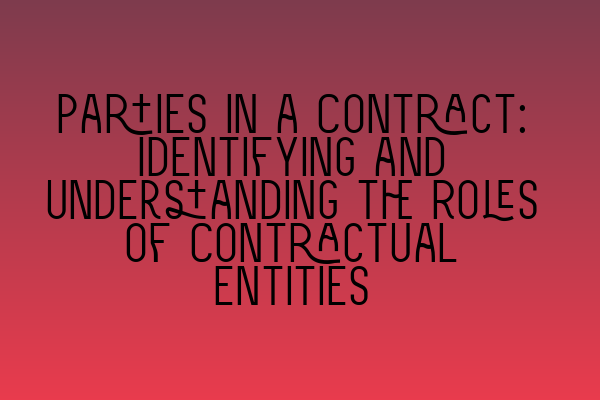When entering into a contract, it is essential to understand the roles of the parties involved. Each contractual entity has specific responsibilities and rights that must be considered for a legally binding agreement. In this article, we will discuss the various parties in a contract and shed light on their roles and obligations.
1. Offeror
The offeror, also known as the promisor, is the party who initiates the contract by making an offer. This individual or organization proposes the terms and conditions of the agreement, including the goods or services to be exchanged, the price, and any other relevant details.
For example, if you are a seller offering a product for sale, you would be the offeror. You are presenting the terms under which you are willing to sell the product to the other party.
Understanding the role of the offeror is crucial, as it helps you navigate the negotiation and acceptance process smoothly. It also empowers you to protect your interests when drafting and finalizing the contract.
2. Offeree
The offeree, also known as the promisee, is the party to whom the offer is made. This individual or organization has the option to accept or reject the offer presented by the offeror. If the offeree agrees to the terms stated in the offer, a legally binding contract is formed.
Continuing with our previous example, if you are a potential buyer considering the offer made by the seller, you would be the offeree. You have the right to evaluate the terms and determine whether they meet your requirements before accepting the offer.
It is important for the offeree to thoroughly review the terms of the offer and ensure that they are satisfied with all aspects before accepting. Any changes or modifications to the offer must be clearly communicated and agreed upon by both parties.
3. Contractors
Contractors are individuals or businesses hired by one of the parties to perform specific duties or provide goods and services as outlined in the contract. They play a vital role in executing the terms of the agreement. Contractors can be independent contractors or subcontractors.
For instance, if you are a company entering into a contract to build a new office building, you may need to hire construction contractors. These contractors will undertake the construction work and fulfill the obligations mentioned in the contract.
Hiring contractors allows the contracting parties to assign specific tasks to external professionals who possess the required expertise and resources. It enables the parties to focus on their respective roles and responsibilities while leveraging the skills of specialized contractors.
4. Third-Party Beneficiaries
In some contracts, there may be third-party beneficiaries who stand to benefit from the agreement, even though they are not signatories to the contract. These beneficiaries may have rights conferred upon them by the contract or enjoy certain protections under it.
An example of a third-party beneficiary could be a company that purchases life insurance for its employees. Although the employees themselves are not parties to the contract between the company and the insurance provider, they are third-party beneficiaries who can claim benefits in the event of an employee’s death.
Understanding the presence and rights of third-party beneficiaries is crucial when drafting a contract. It ensures that their interests are protected and that their rights are clearly defined within the agreement.
5. Assignment and Delegation
In some contracts, the rights and obligations of the parties can be assigned or delegated to another individual or organization. Assigning rights refers to transferring your rights and benefits under the contract to someone else, while delegating obligations means transferring your duties and responsibilities.
For example, if you are a tenant renting a property and you transfer your lease agreement to another person, you are assigning your rights to them. Similarly, if you hire a property management company to handle all your obligations as a landlord, you are delegating your responsibilities to them.
Understanding the rules and limitations surrounding assignment and delegation is vital. It ensures that the rights and obligations of the parties can be transferred efficiently without violating the terms of the contract.
Conclusion
Identifying and understanding the roles of contractual entities is essential for anyone entering into a contract. From the offeror and offeree to contractors and third-party beneficiaries, each party plays a significant role in the formation and execution of a contract.
By being aware of these various roles, you can navigate the contractual landscape with confidence and protect your rights and interests. Whether you are drafting a contract, negotiating its terms, or seeking to enforce its provisions, understanding the parties involved is key to achieving a successful outcome.
For more information and resources related to contract law, take a look at these related articles:
